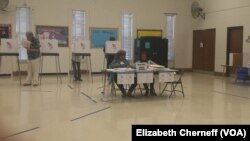On the day he is expected to win all five states holding Republican presidential primaries, Donald Trump reached 50 percent support nationally from Republican or Republican-leaning voters, said NBC News/Survey Monkey.
It is the first time Trump has reached that mark since NBC News/Survey Monkey began its weekly election tracking poll in December.
Trump's challengers -- Texas Senator Ted Cruz and Ohio Governor John Kasich -- lost ground in the survey, finishing double digits behind him.
Trump's overall support in the poll has remained consistent, hovering at well over 40 percent since mid-March. What's significant is that his support among Republicans saw an increase of six percentage points in the latest poll, conducted online, from April 18-24, of 10,707 adults aged 18 and over, including 9,405 registered voters.
Trump needs to win a majority of the delegates Tuesday to help in his quest to clinch the Republican Party's nomination.
The voting in Connecticut, Delaware, Maryland, Pennsylvania and Rhode Island also follows an announcement by Trump's remaining rivals that they are strategically campaigning in a bid to block him from earning a delegate majority.
Trump called the effort by Cruz and Kasich "pathetic" and used his appearances Monday to reiterate his criticisms of the nomination process.
He has accused the Republican Party of treating him unfairly, and said Monday the system is "rigged."
The plan by Cruz and Kasich to stop Trump is aimed primarily at voting a week from Tuesday in the state of Indiana, where Kasich is supposed to avoid campaigning in order to give Cruz a better shot at defeating Trump.
Some voters appeared turned off by the pact as well.
In Indiana, Kathy Hiel said she hadn't made up her mind to vote for Trump until late Sunday's announcement by his rivals. "I'll have to support him now," she said of the front-runner.
In Oregon City, Oregon, Craig Herman said the agreement "doesn't bother me at all," adding, "it's all theater. ... I think they all do this for drama and put out press releases."
But despite their announcement, the plan may be easier in theory than in practice, and Kasich said later Monday that even though he will back off campaigning in Indiana, he still wants his supporters to vote for him.
Trump came into Tuesday with 845 delegates, followed by Cruz with 559. Kasich had 148, trailing even Florida Senator Marco Rubio, who dropped out of the race in mid-March but has 171 delegates.
As has been the case throughout the nominating process, the margin of Tuesday's voting will be important because the more delegates Trump earns the better his chance of reaching the 1,237 he needs. If he fails to hit that threshold, Cruz and Kasich could have a shot at the nomination at the party's convention in July.
Democratic race
In the Democratic race, former Secretary of State Hillary Clinton led polls in four of the five states voting Tuesday, with Vermont Senator Bernie Sanders ahead only in Rhode Island.
A strong showing Tuesday for Clinton would move her to within striking distance of the Democratic nomination. She entered the day with 1,944 delegates, including hundreds of super delegates who have pledged to support her.
The five states voting Tuesday have 463 delegates at stake, and another 285 are available during the next month, meaning Clinton needs to win just over half of them to reach a majority 2,383.
Despite the tough math he faces, Sanders, who has 1,192 delegates, has repeatedly vowed to remain in the race through the July convention.
The self-described democratic socialist has campaigned for higher wages, eliminating special interest money in politics, breaking up big banks and expanding access to healthcare, and has developed a big following among young people.
Sanders told supporters Monday that his campaign is the only one asking Americans to "think outside of the status quo."
Clinton, whose background also includes time as a senator and first lady, gave a speech Monday targeting Trump as out of touch with regular people.
"You got to spend time with Americans of all sorts and backgrounds in every part of our country," she said. "Don't just fly that big jet in and land it and go make a big speech and insult everybody you can think of and then go back, get on that big jet and go back to your country club house in Florida or your penthouse in New York."
Some material for this report came from AP.












